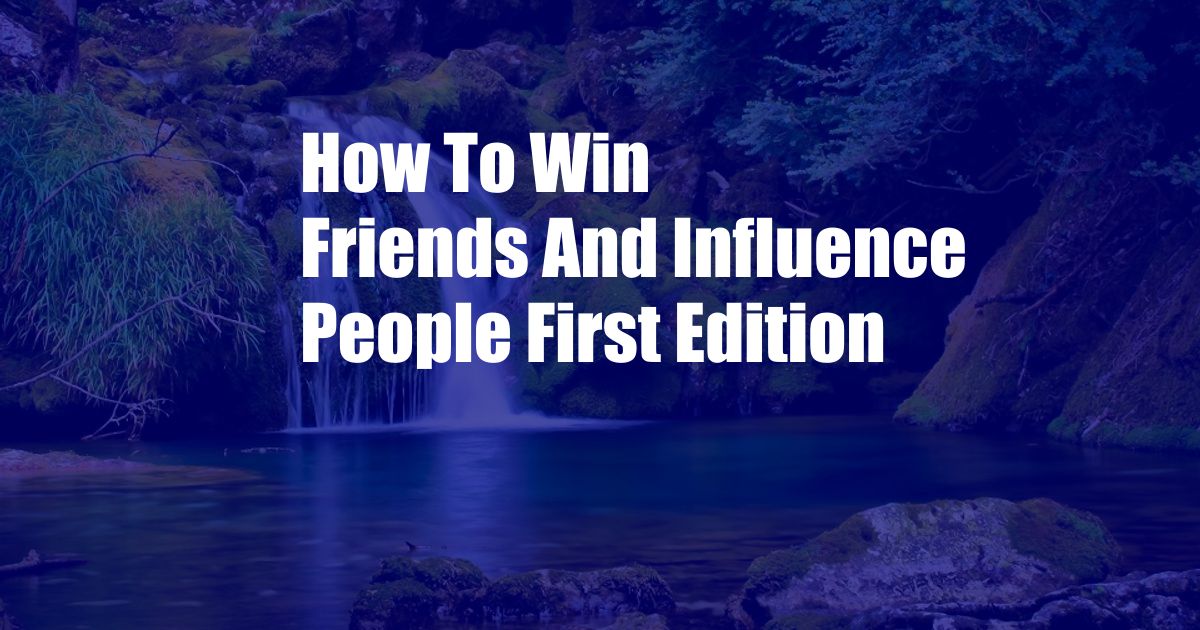
How to Win Friends and Influence People: A Timeless Guide to Personal and Professional Success
Introduction
In the tapestry of life, human connections hold immense power. The ability to form meaningful relationships and influence others positively can open doors to countless opportunities. One book that has stood the test of time as an invaluable guide in this realm is Dale Carnegie’s “How to Win Friends and Influence People.” Published in 1936, this timeless classic continues to captivate readers worldwide, offering timeless wisdom and practical advice.
Carnegie, a renowned speaker and expert in human relations, believed that “winning friends” meant more than mere popularity or charm. It involved cultivating genuine connections, building trust, and inspiring others to follow your lead. With this philosophy at its core, “How to Win Friends and Influence People” outlines fundamental principles and practical techniques that can transform your interactions with others.
The Essence of Relationship Building
Earnest Appreciation and Unconditional Acceptance
Carnegie emphasizes the profound impact of sincere appreciation and unconditional acceptance in fostering meaningful relationships. He encourages readers to express gratitude for others’ contributions and to avoid criticism, condemnation, or blame. By acknowledging the inherent value of every individual, you create a positive and welcoming atmosphere that opens doors for connection and collaboration.
Effective Communication: The Art of Listening and Understanding
Carnegie stresses the importance of listening attentively to others, both verbally and nonverbally. He believes that genuine empathy and understanding can only be achieved when you show interest in what others have to say. This involves not just hearing their words but also observing their body language, tone of voice, and underlying emotions. By listening attentively, you demonstrate respect and value, fostering trust and strengthening relationships.
Mastering the Art of Influence
The “Golden Rule” of Persuasion
Carnegie’s philosophy of influence is rooted in the “Golden Rule” of treating others as you wish to be treated. By approaching interactions with empathy and understanding, you can persuade others without resorting to manipulation or coercion. Carnegie advises against arguing and condemning, as these tactics often lead to resentment and resistance. Instead, he encourages a collaborative approach, seeking mutually beneficial solutions.
Enthusiasm and Positive Energy: The Catalysts for Action
Carnegie highlights the transformative power of enthusiasm and positive energy in influencing others. When you are genuinely excited and passionate about something, your energy is contagious. It inspires others to get on board and motivates them to take action. By sharing your enthusiasm, you create a sense of optimism and forward momentum that can propel you and others towards your goals.
Tips and Expert Advice for Enhancing Your Relationships
Practice Sincere Compliments
Carnegie emphasizes the profound impact of sincere compliments in building rapport and fostering positive relationships. When you recognize and appreciate the accomplishments and qualities of others, you not only make them feel valued but also strengthen your bond with them. However, it’s essential that your compliments be genuine and specific, as empty flattery can quickly erode trust.
Avoid Arguments and Criticisms
Carnegie advises against engaging in arguments or criticisms, as they often lead to defensiveness and resentment. Instead, focus on finding common ground and understanding the other person’s perspective. By approaching disagreements with a spirit of collaboration and compromise, you can preserve relationships while finding mutually acceptable solutions.
FAQ on “How to Win Friends and Influence People”
Q: Is this book only relevant for business and professional contexts?
A: While Carnegie wrote the book with business and professional relationships in mind, its principles apply to all aspects of life, including personal relationships, family dynamics, and community involvement.
Q: How can I apply Carnegie’s principles in today’s digital world?
A: Carnegie’s principles transcend time and technological advancements. They can be applied to online interactions through social media, email, and video conferencing. By practicing empathy, active listening, and genuine appreciation, you can build strong relationships in both the virtual and offline worlds.
Q: Is it possible to influence others without resorting to manipulation?
A: According to Carnegie, true influence is based on empathy, understanding, and collaboration. By focusing on the other person’s needs and goals, you can persuade them without resorting to manipulative tactics.
Conclusion
Dale Carnegie’s “How to Win Friends and Influence People” is more than just a book; it’s a timeless guide to human relations. Its principles and practical advice have helped countless individuals build stronger relationships, achieve greater success, and live more fulfilling lives. Whether you’re looking to improve your personal connections, advance your career, or inspire others to follow your lead, this book will equip you with the tools and insights you need.
Are you ready to embark on a journey of personal transformation and connection? If so, pick up a copy of “How to Win Friends and Influence People” today and discover the secrets to winning hearts and minds.